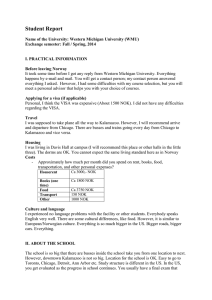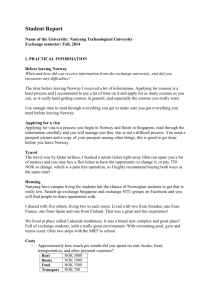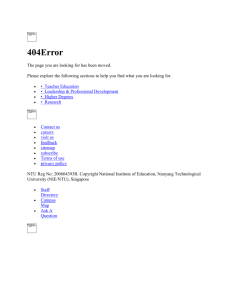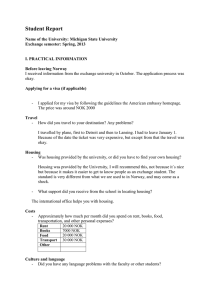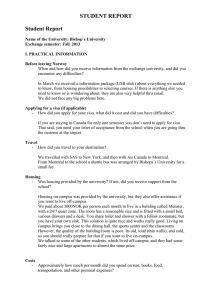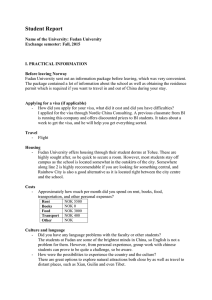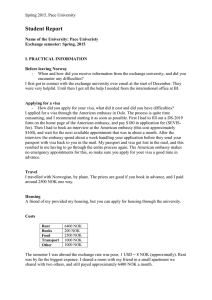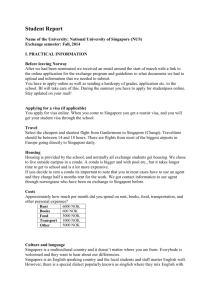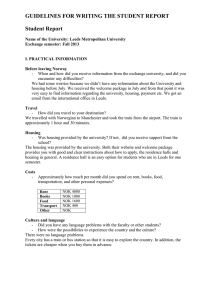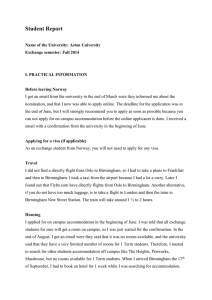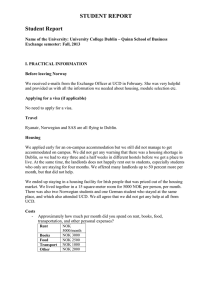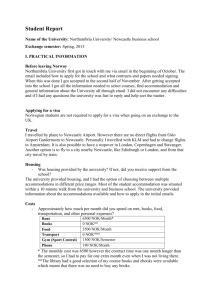Nanyang - Fall 2015 - BI Norwegian Business School
advertisement
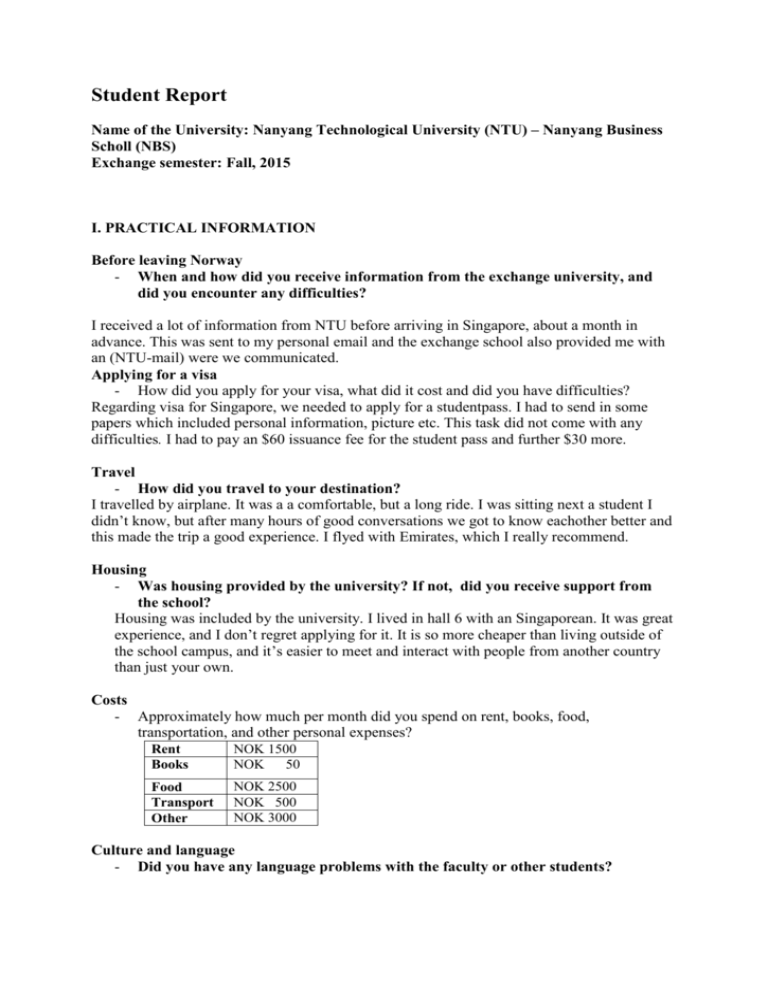
Student Report Name of the University: Nanyang Technological University (NTU) – Nanyang Business Scholl (NBS) Exchange semester: Fall, 2015 I. PRACTICAL INFORMATION Before leaving Norway - When and how did you receive information from the exchange university, and did you encounter any difficulties? I received a lot of information from NTU before arriving in Singapore, about a month in advance. This was sent to my personal email and the exchange school also provided me with an (NTU-mail) were we communicated. Applying for a visa - How did you apply for your visa, what did it cost and did you have difficulties? Regarding visa for Singapore, we needed to apply for a studentpass. I had to send in some papers which included personal information, picture etc. This task did not come with any difficulties. I had to pay an $60 issuance fee for the student pass and further $30 more. Travel - How did you travel to your destination? I travelled by airplane. It was a a comfortable, but a long ride. I was sitting next a student I didn’t know, but after many hours of good conversations we got to know eachother better and this made the trip a good experience. I flyed with Emirates, which I really recommend. Housing - Was housing provided by the university? If not, did you receive support from the school? Housing was included by the university. I lived in hall 6 with an Singaporean. It was great experience, and I don’t regret applying for it. It is so more cheaper than living outside of the school campus, and it’s easier to meet and interact with people from another country than just your own. Costs - Approximately how much per month did you spend on rent, books, food, transportation, and other personal expenses? Rent Books NOK 1500 NOK 50 Food Transport Other NOK 2500 NOK 500 NOK 3000 Culture and language - Did you have any language problems with the faculty or other students? - - It was a little was weird setting in the beginning, speaking English all the time, being in a foreign country and approaching many people from different cultures. I got used to it very fast and I didn’t have any problems communicating with other students or the faculty. How were the possibilities to experience the country and the culture? NTU arranged a lot of social events in the school area and outside as well. If it was a public holday, the school let us know in advance and they gave us information about the event, were they motivated us to attend. II. ABOUT THE SCHOOL - The school NTU is located in western part of Singapore. It’s almost like a huge village with a lot of buildings, canteens, parks and different school faculties. The school area is so big that buses are driving around campus halls and to the different schools all day long, to make it easier to get around for the students and employees. Course registration - When and how did you register for courses? I registered for 10 courses that suited me the most and for this I first needed approval from BI. - When did the add/drop period end? The add/drop period did end two weeks after semester start. Academic calendar Arrival date: First day of the semester: Last day of classes: Examination period: Any special events/holidays: July 30th August 3rd November 16th November 16thDecember 4th Recess week 28-sep – 02 oct Other: Arrival - Describe the introduction week One of the first days of school we had a day introduction seminar with a the exchange students in NTU. They proved some food and a good environment to chat with other students. An organisation for exchange students arranged most of the events after this. The International Office - As an exchange student, did you receive sufficient and relevant information? - I received sufficient and relevant information, and if I was not certain about something I could easily email International office. They proved me good information fast which helped me a lot in some cases. Social activities - How was the relationship with native students and that among exchange students? Especially at my hall, the native students were very welcoming and nice to me. We tended to hang out more with exchange students, at some occasions we hung out all together at hall-events, eating together at the cateen, or going out eating some local food. Some of the natives showed us around in the city where we among others visited Little India and Chinatown. - Are there any special activities, student organisations, and gatherings for exchange students? - It was a students organisation called “One Big Family” which held a lot of events and gatherings, giving us good prices and a welcoming atmosphere. III. ACADEMICS In the classroom - Describe the teaching style (practical, theoretical, cases/lectures, formal/informal etc.) - How is the level and workload compared to that at BI? - I did business courses and the lectures were held in small classrooms with an open atmosphere. We communicated a lot more in class compared to BI. The lecturer often had a powerpoint presentation about the week’s content and after that we discussed and did some tasks. It really depended on the course, but in most cases the classes were informal. It was more practical compared to how the lectures are runned at BI. Almost every week we had assigments which had a due date. Course materials - Describe the course materials used - We rarely used the book. We often used online articles and powerpoints to go through the course’ content. The level of the course material was the same as BI, perhaps a little higher in some courses, for example in finance courses. Exams - Was the exam based on the course materials or on the lectures? - The exam based on both course materials and lectures - How was the course evaluated (include all that apply)? o Final exam o In two of my courses a final written exam counted 50 % o In-class quizzes throughout semester o I had some quizzes, especially in two of my courses o Small assignments and/or papers o I had assignments in every course o Presentations, group work o We had do do at least one presentation in 3 out of 4 of my courses. We also had group work as an assignment. o Class attendance, Class participation/debates o Class attendance counted around 10 % in every course I had o Activities outside of the classroom o In one of my courses we needed to interact with native students and a Singaporean business, finally doing a report about it. Library and technology - Describe the facilities - There were a lot of libraries around the school area, even at the hall-area we had a study rooms with aircondition. They also provded us with computers at the bigger libraries around the school. Description of courses Course code & name Example:FIN123 Finance Bf 2201- Investment Master/ Bachelor Bachelor Bachelor Exam form Prerequisites Comments None Approved as Elective 4-hour written exam 2 hours written exam Basic Finance Required Perhaps the most difficult finance course at NBS, including assignment s, and groupwork as well. The difficulity level is way higher than what I was used to in finance courses at BI. A practical and theoretical course, including group presentatio ns dicussions in class. A pratical and theoretical course, including groupprese AB 3601- Strategic Management Bachelor 2 hours written exam None Required BE2501International Business Environment Bachelor None None Elective BH3603- Cultural Intelligence At Work Bachelor None None Elective ntation, a lot of discussing in class, quizes and one major assignment A very practical course,very similar to “Business Communic ation at BI. On a final note, how will you sum up the exchange experience? Regarding the academic part it was very different from BI, where the workloud was spread out over the whole semester. Some courses had a higher difficulity level than BI in my opion, but some was actually easier. All in all it made it a bit more challenging doing all the courses in English, but you get used to it pretty fast. As for the academic part, I learned a lot and escpecially improved my English speaking level (including the business language). As for a cultural and social point of view, this was one of my greatest experience so far in my life. I met many people from so many different countries and cultures. I’m certain I will keep in touch with many of them. We went to school together, hung out in the sparetime and travelled around in Asia together. You will probably meet some people you will meet in a social setting, or in a business/work related way in the future. I recommend everyone to go on exchange, where you can challenge yourself, go outside of your comfortzone, and do something you will never forget, both academically and socially. Take your opportunity and go on exchange- it’s an adventure.
